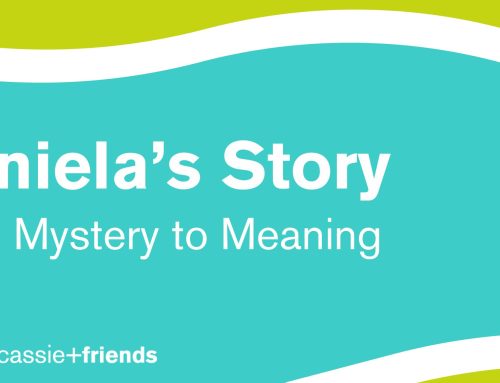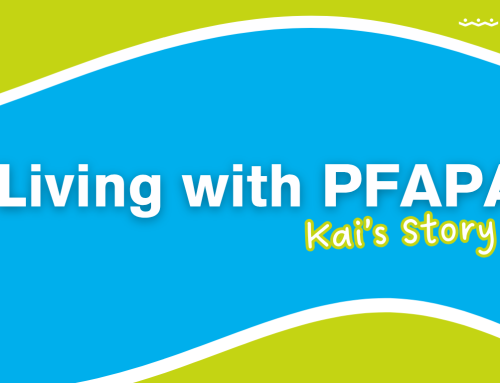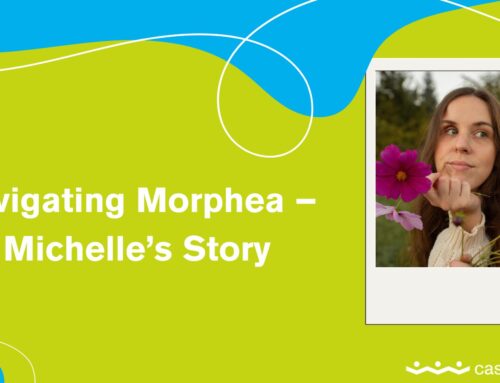Is your family beginning to think about the transition from pediatric to adult rheumatology care? We spoke to one teen who talks about her diagnosis with rheumatic disease at age 14, and how she’s been taking control of her condition two years later. This is a powerful read that offers a few starting points to transitioning to independence and adult care including:
- How to take charge of your appointment schedule
- Determining certain therapy and treatment paths based off your own needs
- How to not “over work” and set healthy limits
- Self advocacy in school and at work
For me, having JIA has been a much different experience than many other kids. I wasn’t diagnosed until I was fourteen, the summer going into high school, so I had a lot of say in my treatment and how public this was going to be for me. I think if I was diagnosed when I was younger, it would more of how I identified myself. By not knowing about my JIA until later, I went about my life as a kid without this formal thing holding me back. Not to say it wasn’t hard, just different.
Before I was diagnosed, I was always sore. Gym class, recess, basically every kid’s favourite parts of their day, were all my least favourite because I was hurting all the time. I was that kid who would try to get hit in dodgeball so I could sit on the sidelines and read my book (and that was/is just part of my personality.) I always held onto stair railings and I would slow down my family when we went on hikes in the forest, but I never knew why.
I can’t really remember why we went to the doctor that summer, I think it was just because my parents wanted to figure out what was going on, I mean, fourteen years of their daughter seeming like she hated doing kid things? They wanted to figure it out, as did I. It took three specialists, two rounds (twelve vials in total) of blood work, an hour of x-rays, and two months, but we got there. Finally, they told me I had mild scoliosis and juvenile idiopathic arthritis.
At first, I started with one lansoprazole (30mg) pill a day and then two naproxen (250mg) a day. After about nine months, we got down to one naproxen (and lansoprazole) a day, then after six more months, one (naproxen and lansoprazole) every other day, and now it’s down to “as needed.” At the beginning of my “as needed” stage, I was still taking them at least once a week. Now though, about a year later, I have gone about two months without taking any naproxen. It feels great honestly. I go to massages, physiotherapy, chiropractic, a rheumatologist, a naturopath, and my regular family doctor all regularly, but I have so much more independence than I even started with.
Although I was older when I was diagnosed, I still had limited independence. I wanted my mom in my appointments with me and I needed to schedule my appointments around her (or my dad’s) work. Also, they had a very major say in my treatment and medication. Now, at sixteen, I almost have my full license, so that means I can get to and from appointments alone. Even now though, I use the city bus, or my boyfriend drives me to my various appointments, since he is a year older than me. Additionally, I refill my prescriptions myself, I choose how often I go to my various therapies and what happens there. For example, when I went to my first chiropractic appointment, my dad dropped me off but from there on, I was on my own. I filled out the forms, I chose whether I wanted acupuncture or not (I did, it was weird the first time,) and I made the next appointment.
As mentioned above, I have several specialists and doctors. They are ALL amazing people and have all helped me in different ways. My RMT helps with relaxation and flare-up relief, my physiotherapist helps with stretching so that I can better work around my flare-ups, my chiropractor helps with pain relief and also stretching, my rheumatologist helps with the technicalities and monitoring of my JIA, my naturopath helps me to get away from my prescription medications when I don’t need them, and my family doctor keeps track of all the craziness.
The most major part of independence for me is definitely my advocacy. I don’t mean me talking to people about JIA, no, I mean choosing who knows about what. Since I was diagnosed as a teenager, I had a say right from the beginning about whether people knew about my JIA or not. Being a teenager is hard enough, I didn’t want to be known for my JIA, I wanted to be known for my intelligence and opinions. Not that there is anything wrong with identifying with JIA, it just wasn’t what I want(ed.) I have worked and still do work very hard to be careful with who I talk to about my JIA. Essentially, my family, my boyfriend, and my three closest friends know the full extent of my JIA. This action was easy for me to take, as I wasn’t diagnosed until later. I think if I had been diagnosed at a much younger age I could have skipped out on some humiliation and pain, but I also would have a stronger tie to my JIA and that label would be harder to shed.
At school, I sometimes have to advocate for myself. Sometimes I can’t write that day because of a flare-up in my fingers, sometimes I need to be able to stand up and stretch, and I always need modifications for my fitness/gym classes. I have to remember to set limits for myself though, as high school students we are told to work harder and harder. We are told so much about how if we “just work harder” then we can eventually be successful. As someone with academic determination, I have to work hard to not over-work myself and remember to set limits.
This idea also applies to work. I have three jobs and sometimes when I have a flare-up, I need to call in sick. This is something I’ve had to work very hard on, as I started my first job just one month after my diagnosis, before I realized that having limits was okay. Calling in sick is okay, and I have to work hard to remember that since no one else can tell how I’m doing, I’m the only measure of my limits.
My biggest take away from my experience with JIA is to remember to embrace other parts of yourself, to try (and learn) new things to make your life how YOU want it, and to always remember that it’s okay to have limits.
If you’re interested in learning more about independent care, check out the Juvenile Arthritis Transitions: Making the Move from Pediatric to Adult Care Webinar recording found here.









Leave A Comment